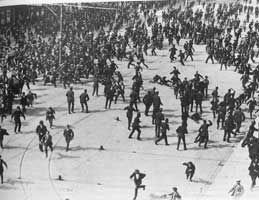
As you may have noticed, I’ve recently found time to complete the book summary of ‘A Long, Long Way’! It’s taken some time, but we’ve got there in the end. I’m now going to start uploading a mix of study resources to help you get to grips with the novel. On the one hand I’ll focus on brief portraits of the main characters, on the other, important themes (probably more of the latter, as these will give you ways in come the exams). Hopefully we can make this novel feel a little more manageable for you. Here, we begin with:
James Dunne
James Dunne is Willie’s father. He is an important authority figure in the narrative. He is the Chief Superintendent of the Dublin Metropolitan Police. Willie’s earliest memories are of his father at parade and the narrative is, in one sense, a tracing of his son’s gradual disillusionment with his father. Willie progresses from childhood hero worship and an adolescent wish to please his father, to youthful doubt and finally adult acceptance of a difference or division in their thinking. James Dunne’s stubborn certainty in his own authoritarian convictions— Unionist, anti-Nationalist, Monarchist— lead to a division between father and son that is at the heart of the narrative. It is, in familial form, a reflection of the wider social divisions opened up during the First World War in Ireland.
The character of James Dunne is, like many of Sebastian Barry’s creations, inspired by a real-life member of the Barry family, Barry’s own maternal great-grandfather.
James Dunne is a striking and in some ways sympathetic figure at the start of the narrative. He rears Willie and his sisters after the death of his wife and provides a loving home. As a police commander he is implicated in the violent suppression of trade unionists in Dublin, but his sympathy for Mr Lawlor indicates some regret about the methods used by his forces in the riots.
Similarly, his pride and sorrow in his son’s volunteering to fight in the British Army show signs of personal vulnerability, and perhaps some doubt about the good nature of his power— within the family, and in society at large— that he unquestionably wields. Mr Lawlor’s judgement, “I don’t care what a man thinks as long as he knows his own mind”, is well applied to James Dunne in the narrative: as his character develops, it becomes clear that James Dunne’s world-view is a collection of emotional allegiances and unexamined prejudices that he is unwilling to examine because they are bound up so strongly with his sense of self.
For as the novel continues it becomes apparent that James Dunne’s love for Willie is conditional on his son’s loyalty to a personal world-view that seems increasingly defensive, conservative and narrow minded. Willie’s at first indirect questioning of his father’s anti-Nationalist prejudices soon become construed by James Dunne as personal attacks. James Dunne cannot admit challenges to his understanding of the world, even from (or rather, especially from) his much-loved and tentatively opinionated son.
Ultimately, James Dunne’s identity as an authority figure— as a figure of strength, from whom unquestioned authority in politics and life flows— is revealed to be founded on weakness. His egotistical certainty of his rightness is finally bound up with his role as a father, and as a respectable servant of the British state. When these are threatened, he reacts with aggression and irrationality, and in some sense this symbolises the aggression and irrationality of the British State itself. His fate at the end of the novel— derangement in the County Home in Baltinglass— are a result of a fragile ego shattered by guilt and shame.

Hi sir, thank you so much for this and with James Dunne, personally I’d focus on the first three scenes and how as a character his sense of duty affects Willie and pretty much shapes his identity!
(Remember to keep safe! Happy(ish) holidays!)